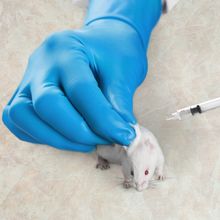scent

Why Do Mosquitoes Bite Some People More Than Others?
Tanvir Khan, PhD and Laura Tran, PhD | Feb 6, 2024 | 2 min read
Scientists itch to decipher the cues that make some people mosquito magnets.

Disease Scent Signatures Disclose What the Nose Knows
Iris Kulbatski, PhD | Jun 12, 2023 | 4 min read
Researchers redefine the lost art of smelling illness using one woman’s exquisitely sensitive nose.

The Smell of Food Affects Metabolism in Fasting Mice
Shafaq Zia | Nov 18, 2022 | 3 min read
The odor prompted the animals’ fat cells to release lipids into circulation.

Smelly Skin Compounds Draw Mosquitoes to Some People More than Others
Katherine Irving | Oct 19, 2022 | 3 min read
People with more carboxylic acids in their body odor are more attractive to mosquitoes, a study finds.

Sex of Researcher Influences Ketamine’s Effects in Mice: Study
Shawna Williams | Sep 8, 2022 | 3 min read
The findings likely have implications for animal research far beyond the study of antidepressants.

The Neuroscience Behind Why Mosquitoes Always Find You
Sophie Fessl, PhD | Aug 18, 2022 | 5 min read
Neurons in mosquito antennae can express more than one olfactory receptor at a time, a redundancy that likely ensures they don’t lose a potential host’s scent.

Mosquitoes Drawn to Hosts Infected by Dengue, Zika
Patience Asanga | Jun 30, 2022 | 4 min read
Flavivirus infections alter the skin microbiome of mice to increase the production of a sweet-smelling compound that attracts the viruses’ insect vectors, a study finds.

Study: People “Click” Better When Their Body Odor Matches
Dan Robitzski | Jun 24, 2022 | 6 min read
Pairs of same-sex friends who reported strong connections when they first met had similar body odors, and body odor similarity predicted whether two strangers would hit it off.

Researchers Discover What Attracts Mosquitoes to Humans
Sophie Fessl, PhD | May 11, 2022 | 5 min read
A brain area of Aedes aegypti responds specifically to components of human sebum, a study finds.

Dogs: The New COVID-19 Rapid Test
Kerry Grens | May 24, 2021 | 2 min read
Two studies this month point to pooches’ quick detection of SARS-CoV-2 on material that touched the skin of infected participants, although the pups’ accuracy does not match that of RT-PCR.

George Preti, Organic Chemist Who Studied Human Body Odors, Dies
Amy Schleunes | Mar 20, 2020 | 3 min read
Over nearly 50 years, the Monell Chemical Senses Center chemist investigated a range of topics, from the smell of cancer to body odor’s effects on human physiology and behavior.

Smells of Nature Lower Physiological Stress
Ashley Yeager | Jan 2, 2020 | 4 min read
In a virtual reality experiment, participants recovered faster from a small electric shock when they could smell natural scents than when they could smell urban odors.

Image of the Day: Smell Circuits
Nicoletta Lanese | Jul 24, 2019 | 1 min read
The brain wiring behind scent processing seems to scale across mammalian species.

Chemicals on the Skin Could Enable Parkinson’s Detection
Shawna Williams | Mar 20, 2019 | 2 min read
Researchers teamed up with a woman with a keen sense of smell to identify telling differences between healthy people and those with the neurodegenerative disease.

Children With Malaria Smell More Attractive to Mosquitoes
Shawna Williams | Apr 17, 2018 | 2 min read
The parasite changes people’s scent, primarily due to an increase in aldehydes.

Study: Autism Linked with Different Reactions to Chemical Signals
Shawna Williams | Nov 27, 2017 | 2 min read
Responses to compounds in human sweat may help explain why people with autism spectrum disorder tend to struggle with social cues.

Epigenetics Paper Raises Questions
Kate Yandell | Oct 16, 2014 | 3 min read
GENETICS publishes a commentary criticizing a Nature Neuroscience paper claiming that mice can inherit smell sensitivities that their parents acquired during life.

Smelling While Sleeping Hurts Memory Consolidation
Rina Shaikh-Lesko | Apr 9, 2014 | 2 min read
The brain’s ability to properly store olfactory information can be disrupted by introducing new sensory stimulation during deep sleep, a mouse study finds.

Behavior Brief
Tracy Vence | Nov 17, 2013 | 3 min read
A round-up of recent discoveries in behavior research
